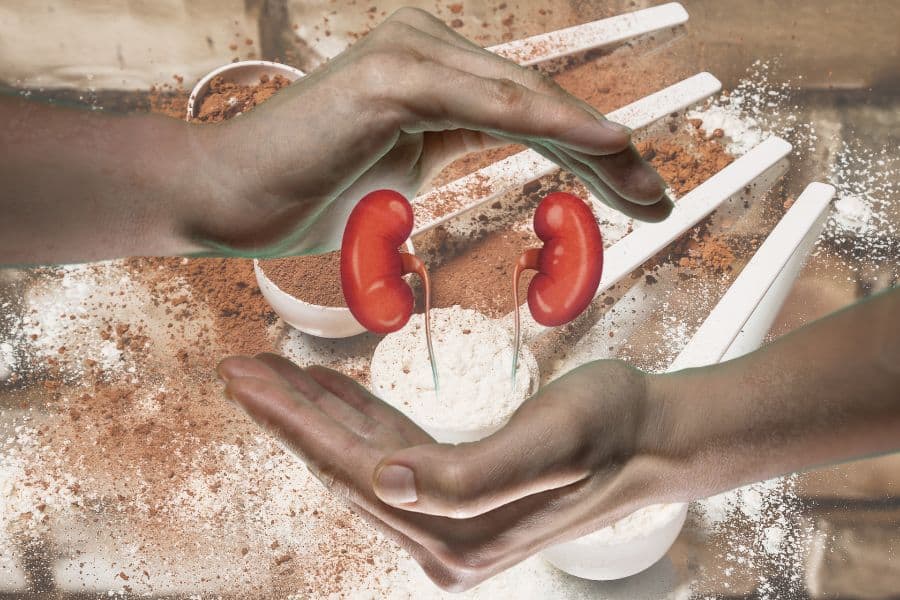Which protein powder is safe for kidneys?

Kidney health is of utmost importance, and selecting the right protein supplement is essential to avoid any potential harm. In this article, we will explore the safety of protein powders for kidneys, the different types of protein supplements, and considerations for individuals with kidney problems.
i. Which protein powder is safe for kidneys?
Protein powders like whey, egg, and soy can be safe for most individuals with healthy kidneys when consumed in moderation and as part of a balanced diet. Let’s delve deeper into each classification of protein supplements and how they relate to kidney health:
1. Whey Protein Powder
Whey protein is one of the most commonly used protein supplements, especially among athletes and fitness enthusiasts. It is derived from milk and contains a high concentration of essential amino acids. When considering kidney health, there are both benefits and concerns associated with whey protein.
Benefits for Kidneys
- Whey protein is a complete protein, meaning it provides all the essential amino acids necessary for muscle maintenance and repair.
- It is quickly absorbed by the body, making it an ideal choice for post-workout recovery when protein intake is essential.
Concerns for Kidneys
- Whey protein contains phosphorus, which can be problematic for individuals with kidney disease, as excessive phosphorus intake can harm kidney function.
- Some whey protein supplements may also be high in sodium, which can contribute to hypertension, a common issue in kidney patients.
Recommendations for Kidney Patients
- Kidney patients should opt for low-phosphorus whey protein supplements to reduce the strain on the kidneys.
- Look for products with reduced sodium content to help manage blood pressure and fluid balance.
- Consult with a healthcare provider or dietitian to determine an appropriate protein intake level.
2. Plant Based Protein Powder
Plant-based protein powders are derived from various plant sources like peas, rice, hemp, and soy. They have gained popularity due to their vegan-friendly nature and potential benefits for kidney health.
Benefits for Kidneys
- Plant-based protein powders are generally lower in phosphorus and potassium compared to animal-based options, making them potentially safer for kidney health.
- They are often rich in fiber, which can aid in digestive health, a concern for some kidney patients.
Concerns for Kidneys
- While plant-based proteins are generally safer, it’s essential to choose products with low sodium levels, as some plant-based options can still be high in sodium.
Recommendations for Kidney Patients
- Opt for plant-based protein powders to reduce phosphorus and potassium intake.
- Carefully read labels to check for sodium content and select low-sodium options when possible.
- Consult with a healthcare provider or dietitian to ensure the chosen plant-based protein aligns with your dietary restrictions.
3. Casein Protein Powder
Casein protein is another milk-derived protein but differs from whey in that it is digested more slowly, providing a sustained release of amino acids.
Benefits for Kidneys
- The slower digestion of casein can help provide a prolonged source of amino acids, which can be useful for muscle maintenance and recovery.
Concerns for Kidneys
- Similar to whey protein, casein protein contains phosphorus and sodium, which should be monitored for kidney patients.
Recommendations for Kidney Patient
- Choose low-phosphorus and low-sodium casein protein products.
- As with whey protein, consult with healthcare professionals to determine appropriate intake levels.
4. Egg White Protein Powder
Egg white protein is derived from egg whites and is known for its high biological value and amino acid profile.
Benefits for Kidneys
- Egg white protein is naturally low in phosphorus and potassium, making it a potentially safe option for kidney patients undergoing dialysis treatment [1]NIH: DIETARY EGG WHITES FOR PHOSPHORUS CONTROL IN MAINTENANCE HAEMODIALYSIS PATIENTS: A PILOT STUDY.
- It provides an excellent source of high-quality protein.
Concerns for Kidneys
- While egg white protein is generally kidney-friendly, it’s still crucial to monitor overall protein intake and consult with healthcare professionals.
Recommendations for Kidney Patients
- Consider egg white protein as a low-phosphorus and low-potassium protein source.
- Ensure moderation in protein intake, and consult with healthcare providers for personalized guidance.
II. Can protein shakes cause kidney stones?
Consuming protein shakes excessively may contribute to the formation of kidney stones as excessive protein may lead to an elevation in urea levels, a byproduct generated during the breakdown of proteins within the bloodstream.
Scientific studies have demonstrated that heightened concentrations of urea and other nitrogenous waste products could potentially result in kidney damage and heighten the susceptibility to chronic kidney disease.
This underscores the importance of individuals with kidney ailments being cautious about how much protein they should take when considering the use of protein supplements.
- While excessive protein intake, especially from animal sources, can increase the risk of kidney stones, it’s crucial to maintain a balanced diet and proper hydration to mitigate this risk.
- Plant-based protein powders, which are typically lower in purines and animal proteins, may be a safer choice for those prone to kidney stones.
III. How to use protein powder in the kidney diet?
If you are considering whey protein powder while managing kidney health, here are some guidelines:
- Control Portion Sizes
- Portion control is essential to avoid overloading the kidneys with excess protein, which can strain kidney function.
- Keep in mind that individual protein needs can vary based on factors such as age, sex, weight, and the stage of kidney disease. Your healthcare team will provide specific guidance.
2. Choose Low-Phosphorus Varieties
- When selecting any protein products, pay close attention to their phosphorus content.
- High levels of dietary phosphorus can be harmful to kidney health, as they can lead to mineral imbalances and negatively affect kidney function.
- Opt for protein powders labeled as “low-phosphorus” or consult the product’s nutrition label to ensure lower phosphorus levels.
3. Monitor Sodium Content
- Excessive sodium intake can contribute to high blood pressure, a common issue in kidney patients. Therefore, it’s crucial to choose protein products with reduced sodium levels.
- Look for protein powders labeled as “low-sodium” or “sodium-reduced” to help maintain blood pressure within a healthy range.
4. Balance Calcium Intake
- Calcium is another mineral that needs careful management in a kidney diet. While calcium is essential for bone health, excessive intake can lead to mineral imbalances.
- Be mindful of the calcium content in your chosen whey protein powder. Select products that align with your recommended daily calcium intake, which may vary depending on your specific dietary needs.
5. Watch Potassium Levels
- If you have potassium restrictions, it’s crucial to select whey protein powders with lower potassium content.
- High levels of potassium in the diet can be problematic for kidney patients, as the kidneys may struggle to regulate potassium levels efficiently.
- Consider discussing your potassium restrictions with your healthcare provider or dietitian to ensure that the whey protein powder you choose aligns with your dietary needs.
IV. What is the best protein shake for kidney disease?
There are two kinds of protein shakes you should know about:
- Ready-to-Drink Protein Shakes
When you’re on the go or looking for a quick fix, you’ll find these pre-made protein shakes at your local store. They’re a convenient choice, but there’s a catch.
- Homemade Protein Shakes with Protein Powder
If you’re into customization and healthier options, you can make your own protein shakes using protein powder. It takes a bit more effort, but it’s worth it. You can make them at home by using a shaker or a blender.
- What’s Inside Ready-to-Drink Protein Shakes?
Ready-to-drink shakes come loaded with additives like emulsifiers, stabilizers, thickeners, sweeteners, and flavors. These ingredients make them taste better and last longer on the shelf. But here’s the downside:
- Those additives could lead to some uncomfortable side effects.
- Over time, they might disrupt your gut microbiome, which is crucial for digestion.
- Gut problems can even play a role in kidney disease, as they contribute to the loss of kidney function.
V. Why You Should Consider Homemade Protein Shakes?
Yes, it involves more effort, but making your own protein shakes with protein powder is a healthier choice. Here’s why:
- You have full control over what goes into your shake.
- You can avoid those potentially harmful additives found in some protein powders.
- It’s a better choice for maintaining your gut and kidney health in the long run.
Conclusion
Selecting the right protein powder is crucial for kidney health, especially if you have kidney issues or are on dialysis. Personalized guidance from a healthcare professional or dietitian is essential to make the safest and most suitable choice for your kidney health.
FAQs
1. Do kidney patients need protein supplements?
Whether kidney patients need protein supplements depends on their treatment. During dialysis, protein supplements can support a high-protein diet due to protein loss during the process, with variations based on dialysis type. However, for non-dialysis patients in chronic kidney disease stages 1 or 2, restricting protein is advised to prevent further kidney damage. A low-protein diet should include essential amino acids for quality nutrition.
2. Is plant protein powder bad for the kidneys?
The good news is that many plant-based protein powders are generally considered safer for kidneys compared to some animal-based options. They are often lower in phosphorus and potassium, which can be beneficial for individuals with kidney issues.
3. How to choose a protein powder when on dialysis?
When choosing a protein powder for kidney health, you should choose a protein powder that is low in phosphorus, low in sodium, low in calcium, and low in potassium.
References







